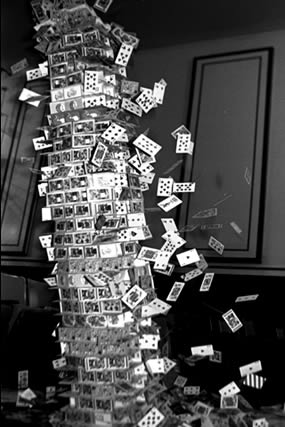Carlo “Charles” Ponzi didn’t invent the con that bears his name. Far from it. The scam goes back at least as far as robbing Peter to pay Paul. Also known as a pyramid scheme, Ponzi himself was just copying it from others.

But Ponzi did orchestrate his own version of this shell game in Boston in 1920. His short-lived master piece promised investors 50% returns by investing in international postage stamps. While a rather dubious proposition, the supposed business model was perfectly legal. It’s just that Ponzi made no attempt to actually engage in it. Instead, he put all the money in banks, spent lavishly on his new lifestyle, and just paid off old investors with money from new investors. For a while it worked as new investors flocked to him. So many in fact, that Ponzi was soon handling millions of dollars, and he gained a little wiggle room by purchasing a controlling interest in the Hanover Trust Bank of Boston.
Of course everything soon unraveled. It only took about half a year from start to finish, but by the time it was over, five banks had collapsed and the remaining investors got back only thirty cents on the dollar. Which is still more than MtM pays us, but I digress.
Anyway, on Tuesday the U.S. Justice Department publicly referred to FullTiltPoker.com as a Ponzi Scheme.
What?
Not only is the USJD’s accusation pretty dishonest, but to the tiny extent that it’s kinda sorta now true, the USJD itself had as much a role in the matter as the people at Full Tilt. Let me explain.
Full Tilt was one of three poker-playing websites that the feds shut down on gambling charges in April. Now they’re calling Full Tilt a Ponzi scheme on the grounds that: the owners paid themselves too much; the company hasn’t had enough money to payoff all players’ accounts since August 2010, despite promises to the contrary; and that it was moving money around to do so.
Hmm, that does sound suspicious.
But unlike an actual Ponzi scheme, which has no income beyond investor deposits, Full Tilt had been operating with a legitimate business model since 2004. It charged fees to players for providing the service of online poker, and it actually made tidy profits doing so, something many “legitimate” websites, *cough* *cough*, would be envious of.
What’s more, for the USJD to now bandy about the term Ponzi scheme is some pretty rich irony. Why? Because Full Tilt’s inability to secure all of its players’ accounts is the direct result of the government harassment. The United States threatened and coerced the third-party money processors that Full Tilt relied on. As access to them withered, and some of them even absconded with funds, Full Tilt’s ability to payoff players decli ned.
ned.
Oh yeah, and one more thing. When the federal government shut down Full Tilt last April, it also seized well over $100 million of its assets. That also made it really hard to cover all its financial obligations.
So while the company probably did break several laws along the way (the entire venture skirted federal gambling prohibitions), Full Tilt was clearly not a Ponzi scheme. At best, the Justice Department’s use of the term was theatrical. At worst, it was a bold faced lie.
And maybe I’m a hopeless romantic, but I still think that if there’s one federal agency that should never, ever lie to the American people, it’s the goddamned Justice Department. Plus, I just love me a good poker game.
A real straight shooter, Cheesy Bruin tomorrow. In the meantime, get with me here, here, and here.

